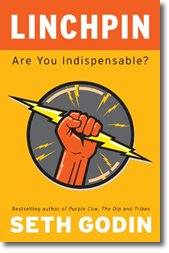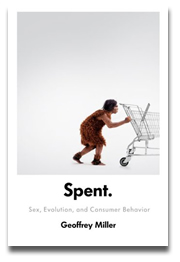September 24th, 2010

Pink, Daniel H. Drive : the surprising truth about what motivates us. Riverhead Books, 2009.
Several years ago, in A Whole New Mind, Daniel Pink argued that American professions have been dominated by analytical thinkers, but soon these left-brained MBA number crunchers would be replaced by a different kind of worker, the right-brained designer, storyteller and big picture thinker. These new workers would offer a new skill set to their employers — creativity, empathy, joyfulness and meaning.
In his new book, Drive, Pink picks up the related theme of motivation. He argues that the incentive plans used by most organizations do not work. Even worse, there is scientific evidence that money acts as a de-motivator. Pink advises managers to pay people fairly and adequately to take money off the table, but he shows that the most effective reward is intrinsic — performance of the task itself.
Pink describes successful people as hard working and persistent. They possess an internal desire to control their lives, to learn about their world and to accomplish something that endures. They work hard to grow and develop, and to connect to a larger purpose. These workers have higher self-esteem and better interpersonal relationships than those who are extrinsically motivated. Every organization needs to retain and cultivate these creative, problem-solving, big picture people.
This book presents interesting ideas but the treatment is rather surface. In the final pages is a chapter summary, a cocktail party summary, plus a Twitter summary, “Carrots & sticks are so last century”. Drive says for 21st century work, we need to upgrade to autonomy, mastery & purpose.
© Reviewer: Meg Trauner & Ford Library – Fuqua School of Business.
All rights reserved.
Posted by Meg in Book Reviews | No Comments »
Tags: Management
September 21st, 2010
After.life
Blood Done Sign My Name
Coco Before Chanel
Death at a Funeral
Fallen
Fuel
Ghost Writer
Kick-ass
The Last Station
La Mission
Pink Panther Classic Cartoon Collection
Stole
Temple Grandin
The Time Machine Read more …
Posted by Paula Robinson in New Resources | No Comments »
Tags: DVDs
September 9th, 2010

A Nobel prize winner, university faculty, and industry insiders explore the whys and wherefores of the current “Great Recession” in these Top 5 new titles in Ford Library.
Click the titles below for information on location and availability.
- Freefall : America, free markets, and the sinking of the world economy. by Joseph E. Stiglitz. W.W. Norton & Co., 2010.
Nobel Prize winning economist analyzes the global economic crisis and describes what should be done to promote growth and stability.
- Crisis economics : a crash course in the future of finance. by Nouriel Roubini and Stephen Mihm. Penguin Press, 2010.
NYU Economics professor Roubini (Dr. Doom), who forecasted the economic crisis in 2006, explains that financial systems are inherently prone to collapse and recommends change to bring transparency and stability to financial institutions.
- Paper fortune$ : modern Wall Street : where it’s been and where it’s going by Roy C. Smith. St. Martin’s Press, 2010.
NYU faculty member and former Goldman Sachs banker tells the story of Wall Street and the people who shaped it from a boutique business to a global industry.
- How markets fail : the logic of economic calamities. by John Cassidy. Farrar, Straus and Giroux, 2009.
Traces the rise and fall of free market ideology, including how the rational pursuit of self interest created the economic crisis, and how it must be replaced by reality-based economics that recognizes human irrationality and interdependence.
- The crisis of capitalist democracy. by Richard A. Posner. Harvard University Press, 2010.
Circuit Court Judge and Chicago School economist analyzes the economic collapse and questions the ability of government to respond effectively to the Great Recession.
© Meg Trauner & Ford Library – Fuqua School of Business.
All rights reserved.
Posted by Meg in Book Reviews | 1 Comment »
Tags: Economics, Recession
September 2nd, 2010

Datar, Srikant M. et al. Rethinking the MBA : business education at a crossroads. Harvard Business Press, 2010.
When I earned an MBA several decades ago, the degree was considered a passport for many jobs, particularly in consulting and finance. When leading firms wanted to adopt new business insights and analytical skills, they would hire MBAs from top schools. But today, according to a new book from Harvard Business Press, some employers are questioning the value of MBA degrees, and students are bypassing the traditional two-year daytime MBA in increasing numbers in favor of alternatives including executive, one-year, or part-time MBA programs, as well as in-house company programs.
In Rethinking the MBA, authors Datar, Garvin and Cullen analyzed the programs at top MBA granting institutions, and found that overall, the schools are strong in training students to perform analysis. Today’s changing world economy, however, reflects a growing need for more effective leaders and entrepreneurs. Business schools, the authors assert, need to teach students the values, attitudes and beliefs that form managers’ worldviews, and to develop key management skills, such as how to build group consensus, or to negotiate through the power politics of large organizations.
Looking across MBA programs, the authors identify eight needs that are poorly addressed by business schools today. Several of them are at the heart of teaching at the Fuqua School, including gaining a global perspective; developing leadership skills; and thinking critically and clearly. Calling for a re-balancing of the curriculum in favor of guided practice and self understanding, the authors recommend use of cases over lectures, and describe new pedagogies, such as reflective exercises and experiential learning.
© Reviewer: Meg Trauner & Ford Library – Fuqua School of Business.
All rights reserved.
Posted by Meg in Book Reviews | 1 Comment »
Tags: Business Education
August 26th, 2010

Poundstone, William. Priceless : the myth of fair value (and how to take advantage of it). Hill and Wang, 2010.
Years ago, a businessman asked me to recommend a good book on pricing, which is when I first realized that good books on pricing are hard to find. It turns out that more than just a number, price is dependent on context, and any given price can be viewed as a bargain or a rip-off depending upon how it is framed.
In Pricing, author Poundstone describes the psychology of pricing. In most of the book, he describes experiments by well-known a psychology researchers, including those of Fuqua faculty member Dan Ariely, whom he describes as a brilliant Israeli American. Poundstone describes a variety of pricing tricks, some of which are centuries old. He uses cases to illustrate the powerful effects of anchoring and adjustment. He also offers suggestions to use in price negotiations, for example, to threaten to walk away from the table rather than to agree to an unacceptable starting point.
A number of books on behavioral psychology have been reviewed in this blog including Nudge by Richard Thaler; How We Decide by Jonah Lehrer; Sway by Ori and Rom Brafman; and the Upside of Irrationality by Dan Ariely. All of these books, including Priceless, are informative and interesting reads. At the end of the day, however, it is probable that even those who have read these books will continue to find themselves manipulated by price. It turns out that even things that no one believes still influence our behavior.
© Reviewer: Meg Trauner & Ford Library – Fuqua School of Business.
All rights reserved.
Posted by Meg in Book Reviews | No Comments »
Tags: Consumer behavior, Economics
August 26th, 2010
Last March the Ford Library began subscribing to Capital IQ after a number of students’ requested it. At that time I had some idea that it was a powerful deal database, but that was about it. So, after signing on to Cap IQ, I was more than pleasantly surprised by the depth of information and ease of use this source provides. Not only is there information on deals, but the database contains financial modeling and quantitative analysis for companies and industries worldwide, plus screening tools that are, as mentioned earlier, very easy to use.
I can see that this database will be popular with our students interested in deal making as well as those working on their job search, so if you’re a current Fuqua student and want to register for it, go to our database page and click on the Capital IQ link. Your login will then be forwarded to you.
Posted by Jane in Featured Resources | No Comments »
August 23rd, 2010

Duke University Libraries (and Ford Library) will be activating a new e-journal management tool tomorrow morning (Tuesday, August 24). You may notice some brief interruptions in your access to e-journals at that time; but these are likely to be short-lived.
Prior to this change-over, Ford Library has temporarily disabled the e-journal search box in the “E-journals” tab of our home page; but has provided a link to the main Duke Libraries e-journal search box. Our own search box will become available again sometime Tuesday morning after the change-over
We will also be introducing a new, tabbed browsing page for our Selected E-journals on our web site. As we’ve added more e-journal titles, our current, 3 column format became too dense to scan quickly. We hope you’ll find the new tabbed list easier to read and use.
Thank you for your patience during this transition, and please email us if you have any questions or concerns about this change. Your feedback is always welcome.
Posted by Carlton Brown in Announcements, E-Journals | No Comments »
August 19th, 2010

Godin, Seth. Linchpin : are you indispensible? Portfolio, 2010.
Best-selling author Seth Godin has written his latest book for employees in the new world of work. Employees have been trained to be a cog in the industrial machine, yet ultimately, the way to achieve success is to stand out and to become indispensable. Godin calls those people “linchpins,” and they cannot be replaced because their roles are just too valuable.
To become a linchpin, a worker must seek opportunities to do more than what is assigned. They must take the initiative to do what is necessary for the organization to succeed. Linchpins connect easily with other people and work collaboratively with coworkers and customers. They make positive things happen.
Godin encourages everyone to become an “artist” at work by being creative, making connections and finding joy in work. And he encourages everyone to put their heart and soul into all aspects of their lives.
Linchpin is Seth Godin’s twelfth book since 1999 and it reads as if it were written in a hurry. The style is choppy and terse. The ideas could have been presented in a much shorter and better organized format. I found this book a chore to read, but on Amazon.com, other readers rated it very highly, with the reviews averaging 4.5 stars, far better than most.
© Reviewer: Meg Trauner & Ford Library – Fuqua School of Business.
All rights reserved.
Posted by Meg in Book Reviews | No Comments »
Tags: Human Resources, Success
August 12th, 2010

Miller, Geoffrey. Spent : sex, evolution, and consumer behavior. Viking, 2009.
If a $1,200 high-quality replica of the Rolex President watch is difficult to distinguish from the $30,000 original, why do people pay the $28,000 premium for the real one? And why do Americans work long and hard for money to buy status products, when the pleasures they are bring are short-lived? Human evolution offers some answers.
In Spent, evolutionary psychologist Geoffrey Miller explains that humans evolved in small social groups in which image and status were important for attracting mates and rearing children. Modern humans possess the same instincts as those early social primates. People still advertise their ability to survive and reproduce, and unconsciously, they use status products to display their biological fitness to one another. The Rolex watch signals that the wearer is wealthy, intelligent and sexy, important traits in a mate.
Miller also discusses the engine of our consumer capitalism – marketing. Marketers use advertising to create psychological links between products and the traits that consumers want to display by hinting in vague terms the possible status and sexual payoffs for buying and displaying premium products.
This short review cannot do justice to the many ideas in this important work. The book is full of challenging insights, and numerous examples. The writing style is clear and entertaining. Miller concludes that by spending less time purchasing goods, humans would have more time to enjoy life and find suitable mates and friends.
© Reviewer: Meg Trauner & Ford Library – Fuqua School of Business.
All rights reserved.
Posted by Meg in Book Reviews | No Comments »
Tags: Consumer behavior
August 11th, 2010

The following post further describes changes to Duke Libraries EIU Publications subscriptions and products that Ford Library provides to Duke University. Some of the links in this post may require off-campus users to activate a Duke VPN connection.
Due to their excessively high costs, we could no longer subscribe to the Economist Country Reports, and several other Economist Intelligence Unit publications. This linked graphic details the components of our subscription that we will be dropping (in red), and those we will retain (in green). Note that some of this EIU content will be available via ProQuest as described below.
The pricing of the full suite of the EIU Country Reports has increased steadily over the years until they reached over $50,000.00 for our online access. As you may know, Duke University continues to be in conditions of economic stress, and Ford Library, which funded the majority of Duke Libraries EIU subscription, could simply no longer accommodate the cost impact of the Reports on our e-resource budgets.
Ford Library has, however, scaled up our access to comparable data via a number of other databases, and will continue to provide Duke with other resources for strong coverage of globally focused economic and business news and data.
Proquest has significantly improved its available resources in this area; and includes access to a number of comparable, subject focused country reports from the Economist Intelligence Unit. Our IHS Global Insight database has comparable access to country reports, and better tools for macroeconomic data retrieval. ISI Emerging Markets also has excellent news and macroeconomic data coverage.
Please respond in the comments below if you have any questions or concerns about this change. Your feedback is always welcome.
Posted by Carlton Brown in Announcements | 2 Comments »
Tags: Economics, Library Databases







